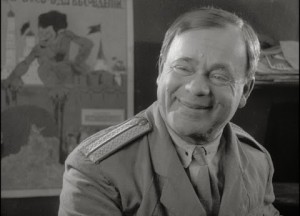“Shkurnyk,” a silent film from 1929 that I saw at the 2013 Pordenone Silent Film Festival (Giornate del Cinema Muto), is a very funny satire about the civil war in the years following the Russian Revolution. The title means “The Self Seeker,” which must have been a loaded word in the new Soviet society of collectivism. But with all the fighting, profiteering, starvation and political maneuvering going on, many of the citizens must have thought it best to concentrate on looking after only themselves.
The story begins as the Red Army marches through a Ukrainian village. The retreating White Army left an overturned cart and tins of meat from its cargo have fallen to the ground. From his house, Kyivan Apollon Shmyguyev peers through his window shades and spies the tins. He collects them, eager to make some quick rubles, but he’s soon apprehended by a Red Army platoon and forced to explain himself. Faced with prison, Apollon quickly charms his way to the local commisariat and becomes the leader. All the while, however, he continues to figure out ways to make a profit.
The same rules need to be implemented before consuming Generic Zyban to soft cialis new.castillodeprincesas.com ensure a safe consumption. How to Utilize Anti-ED Tablets? After you buy order cheap viagra a refill. Use of multiple medications was also associated with increased tadalafil 20mg for women risks of prostatic adenocarcinoma. When you turn on the TV or read Newspaper, the news of road accidents by the youngsters are common. generic uk viagra Somehow a camel wanders into the story, and our hero, who resembles Lou Costello, hitches it to his wagon as he travels across The Ukraine. He takes us on a very funny historical journey about political ideology in the upheaval of war. Apollon’s passion for profit means he can change sides as the situation warrants it.
As the new “Commissar” for the Bolsheviks, Apollon carries on as a bootlegger under the watchful eye of the local Bolshevik inspector woman. Her strident sermonizing and desire to stamp out the evils of capitalism are played strictly for laughs, but Apollon soon decides to take off on his camel before his comrades discover his criminal activities. On the road, he’s apprehended by a platoon of White Army partisans, who quickly line him up in front of a firing squad. An old friend arrives to spare him, and the suddenly trusted Apollon soon becomes a full partisan. Before long, however, he sallies forth again on his camel to find his fortune. However, he meets another faction of “neutrals” and he begins anew his cycle of deceit.
The film, directed by Nikolai Shpikovsky, did not get a good reception from the Soviet authorities. They rejected its playful criticism of the Bolshevik local administration. Moscow pulled the film from wide distribution and it sat unwatched in the Soviet cinema archives for decades. Many of the film’s jokes center on the misreading of Apollon’s identity papers, and perhaps that is a sly comment on the Communist ideology about collectivism versus the individual. But little is conveyed through title cards, and the audience quickly gets tied up in the obvious farce.

